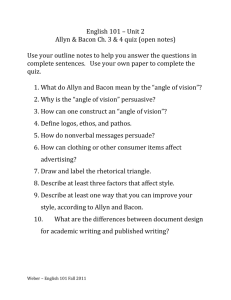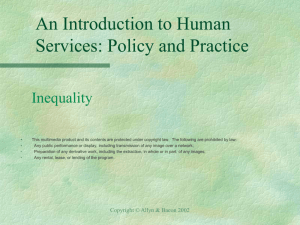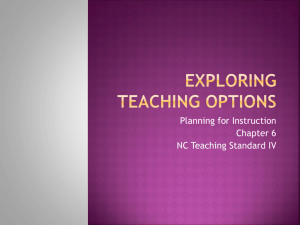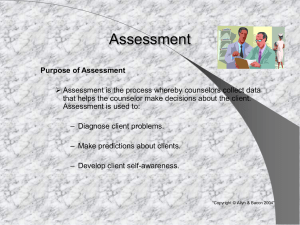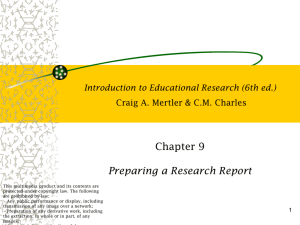Science and Research
advertisement
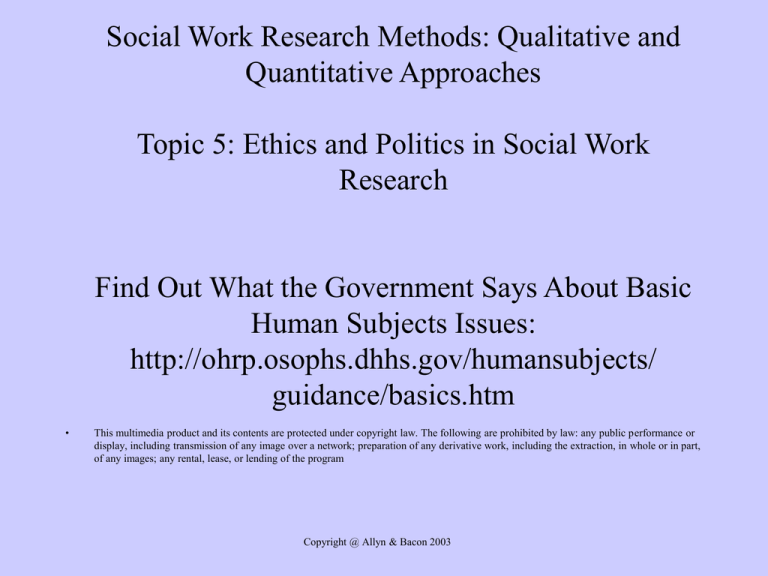
Social Work Research Methods: Qualitative and Quantitative Approaches Topic 5: Ethics and Politics in Social Work Research Find Out What the Government Says About Basic Human Subjects Issues: http://ohrp.osophs.dhhs.gov/humansubjects/ guidance/basics.htm • This multimedia product and its contents are protected under copyright law. The following are prohibited by law: any public performance or display, including transmission of any image over a network; preparation of any derivative work, including the extraction, in whole or in part, of any images; any rental, lease, or lending of the program Copyright @ Allyn & Bacon 2003 Topic 5: Ethics and Politics in Social Work Research • • • • • • • • Why be ethical? What are the basic human subjects issues? What is informed consent? What does an informed consent statement look like? Why be concerned about special populations? What are subjects rights? What are the boundaries between research and practice? What are some misuses of evaluation of practice? Copyright @ Allyn & Bacon 2003 Why Be Ethical? • Most unethical behavior results from a lack of awareness, or pressures to take shortcuts in building a career, gaining prestige or holding a job. • Ethical social work research takes longer to complete, costs more money, is more complicated, is more difficult to do (compared to other social science research), and is required by NASW, CSWE and other licensing bodies and professional associations. Copyright @ Allyn & Bacon 2003 Why Be Ethical? continued… • Scientific misconduct – occurs when a researcher falsifies or distorts the data or methods of data collection, or plagiarizes the work of others. • Research fraud occurs when a social work researcher fakes or invents data or falsely reports how research was conducted. • Plagiarism – is fraud that occurs when a social work researcher steals the ideas or writings of another or uses them without permission Copyright @ Allyn & Bacon 2003 Why Be Ethical? continued… • Power – the relationships between social work researchers and clients or subjects involves power and trust legitimized by credentials, expertise, training and respect for the role of science. • Scientific behavior should be both legal and ethical; but it could be legal and unethical, it could be illegal and ethical, or both illegal and unethical. Copyright @ Allyn & Bacon 2003 What are the basic Human Subjects Issues? • Social work research can harm a client or participant in several ways. • Physical harm – basic safety and protection from injury, special provisions for high-risk clients. • Psychological harm – care not to subject people to stressful, embarrassing, anxiety-producing or unpleasant situations. Copyright @ Allyn & Bacon 2003 Human Subjects Issues continued… • Legal Harm – protecting people from increased risk for arrest; dealing with the discovery of illegal behavior. • Deception – social work researchers follow the ethical principle of voluntary consent: never force anyone to participate in research. Any researcher anticipating deception would need to receive guidance from an IRB, or Institutional Review Board. Copyright @ Allyn & Bacon 2003 What is Informed Consent? • A basic ethical principle of never forcing anyone into participating in research, it must be completely voluntary. • It is not enough to get permission, researchers must acquire a written agreement that specifies a number of very specific procedures to protect the client’s or subject’s rights. Copyright @ Allyn & Bacon 2003 What does An Informed Consent Statement Look Like? • A brief description of the purpose and procedures. • A statement of any risks or discomfort. • A guarantee of anonymity and the confidentiality of records. • Identification of the researcher and information about rights, oversight and auspice. Copyright @ Allyn & Bacon 2003 An Informed Consent Statement continued… • A statement that participation is completely voluntary and can be terminated at any time without penalty. • A description of any alternative procedures. • A statement of any benefits or compensation available and the number of subjects involved. • An offer to provide a summary of the findings. Copyright @ Allyn & Bacon 2003 Why be Concerned about Special Populations? • Students, prison inmates, employees, military personnel, people who are homeless, TANF recipients, children, those developmentally delayed may agree to participate, but they may not be fully capable of making an informed decision and hence it may be necessary to obtain permission from a legal guardian. • Creating new inequalities can arise if a researcher designs a study to introduce a new treatment to be offered to those in an experimental group but not to a control group. In these cases special creative solutions in study design may need to be developed to be sure no one suffers. Copyright @ Allyn & Bacon 2003 What are Subjects’ Rights? • Privacy – the right of the individual to decide whether to share personal information, including identity, with others. • Anonymity – the right to remain unknown and nameless. • Confidentiality – the right to keep information that is shared with others from being distributed. Copyright @ Allyn & Bacon 2003 What are the Boundaries Between Research and Practice? • Practice – interventions that are designed solely to enhance the well being of a client or client system and that have a reasonable expectation of success. • Research – activities designed to answer a question, test a hypothesis and permit conclusions and contribute to a larger body of knowledge. Copyright @ Allyn & Bacon 2003 What are some Misuses of Evaluation of Practice? • Asking the ‘wrong’ research question. • Requesting a review after a decision has already by made. • Demanding an inappropriate design or data collection technique. Copyright @ Allyn & Bacon 2003 Misuses of Evaluation continued… • Interfering with the design or procedures to insure it produces desired results. • Continuing a program when evaluation results show it to be ineffective, or terminating a program found to be effective. • Suppressing/deleting positive results in order to reduce a program or suppressing/deleting negative results in order to continue a program. Copyright @ Allyn & Bacon 2003
